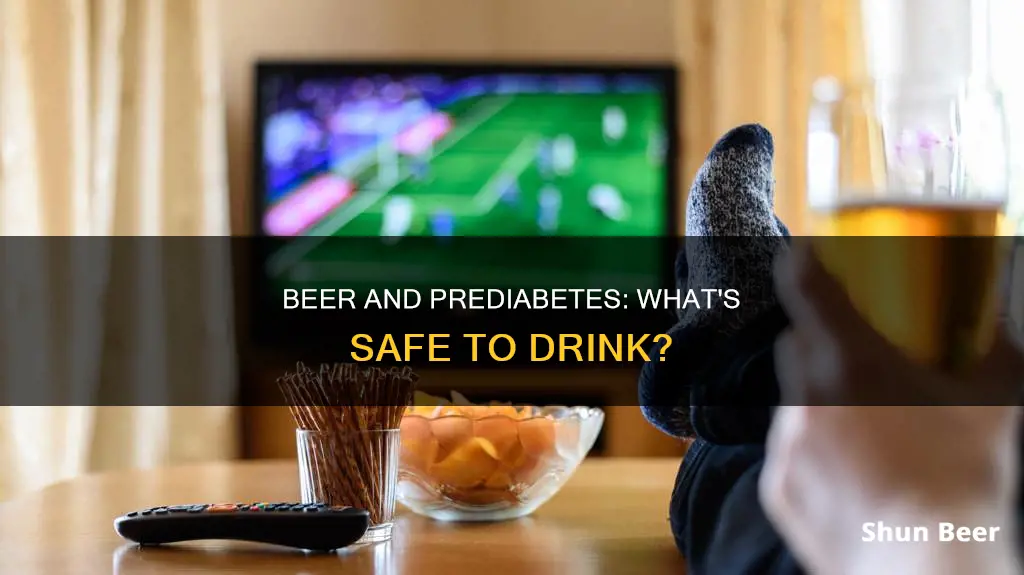
Drinking alcohol is a complicated issue for people with prediabetes or diabetes. Alcohol can affect blood sugar levels and interfere with diabetes medications, but moderate drinking may be safe for people with diabetes as long as they choose the right drinks and consider alcohol's effects on their blood sugar levels. Excessive alcohol consumption can increase the risk of chronic diseases such as heart disease, liver disease, and kidney disease, so it is important to drink in moderation and follow recommendations from healthcare professionals.
| Characteristics | Values |
|---|---|
| Can I drink beer with prediabetes? | Yes, but in moderation. |
| Recommended daily alcohol intake | No more than one drink per day for women and up to two drinks per day for men. |
| Beer serving size | One drink is considered to be 12 ounces. |
| Beer and blood sugar | Beer contains carbohydrates, which can cause blood sugar spikes and falls. |
| Beer and diabetes medication | Alcohol can interfere with diabetes medication, leading to low blood sugar. |
| Preventing hypoglycemia | Drink with food, monitor blood sugar levels, and stay hydrated. |
What You'll Learn

Beer and blood sugar
Beer is a significant source of carbohydrates, so it can impact blood sugar levels. Depending on the type, it can also be high in calories, so drinking beer may contribute to weight gain over time. Some types of beer can be higher in alcohol, too.
The liver is responsible for clearing glucose and alcohol from your system. Therefore, drinking alcohol can slow down carb metabolism, potentially leading to low blood sugar (hypoglycemia). This effect is exacerbated when drinking alcohol with diabetes medication. As such, it is essential to be mindful when consuming beer if you have diabetes.
How to Drink Beer Safely with Diabetes
- Be mindful of the ABV: Beers with lower ABVs will have closer to 6 grams of carbs, whereas higher ABV beers may have as much as 20-30 grams per 12-ounce bottle.
- Keep an eye on serving size: The American Diabetes Association (ADA) recommends no more than one 12-ounce drink per day for women, and up to two 12-ounce drinks per day for men.
- Enjoy a meal with your beer: When you drink on an empty stomach or in excess, the carbs in the beer can cause blood sugar to spike and then fall quickly, potentially causing hypoglycemia. By eating a balanced meal with protein, fibre, and healthy fats, the alcohol in your beer is absorbed more slowly, keeping blood sugar more stable.
- Check your blood sugar more frequently: Staying within the blood sugar safe zone of 70-180 mg/dL is important. Check your blood sugar before, during, and up to 24 hours after drinking.
- Be extra cautious if you take medication: Insulin and insulin-stimulating medications may need dosage changes when consuming alcohol. Consult your diabetes healthcare provider for advice on how to adjust your medications, including insulin, on days you consume alcohol.
Beer and Colds: Is It Safe to Drink?
You may want to see also

How much beer is too much?
Beer is not off-limits for people with prediabetes, but it's important to be mindful of how much you drink and how it affects your body. Here are some guidelines and recommendations to help you manage your beer consumption:
Beer typically contains a moderate amount of carbohydrates and has an alcohol by volume (ABV) ranging from 2% to 12%. The number of carbohydrates in a beer depends on its ABV, with lower ABV beers having around 6 grams of carbs and higher ABV beers containing up to 20-30 grams of carbs per 12-ounce bottle. To keep your carb intake in check, it's advisable to opt for beers with an ABV of 7% or less.
The American Diabetes Association (ADA) recommends no more than one drink per day for women and up to two drinks per day for men. One drink is equivalent to 12 ounces of beer, which is typically the amount in a can or bottle. If you're drinking beer on tap, keep in mind that a pint is 16 ounces, so you're getting more than a single serving. To stay within the recommended limits, you can request a smaller size or be mindful of the extra ounces when pouring from a tap.
It's important to enjoy your beer with a meal. Drinking on an empty stomach or in excess can cause a spike and then a quick drop in blood sugar levels, leading to hypoglycemia. This is because alcohol interrupts the body's blood sugar regulation, and the liver, which stores glucose, prioritises clearing alcohol from the body. By having a balanced meal with protein, fibre, and healthy fats, you slow down the absorption of alcohol, keeping your blood sugar more stable.
Additionally, it's crucial to monitor your blood sugar levels frequently, especially before, during, and up to 24 hours after drinking. The blood sugar safe zone is considered to be between 70-180 mg/dL. Checking your blood sugar levels regularly will help you identify if you need to make adjustments to your drinking habits or seek medical advice.
If you are taking insulin or insulin-stimulating medications, be cautious and consult your healthcare provider about adjusting your medication when consuming alcohol. The effects of alcohol can interfere with your medication and increase the risk of hypoglycemia. It's also important to be mindful of the symptoms of hypoglycemia, such as dizziness, confusion, and lightheadedness, as they can be similar to the symptoms of drunkenness.
In summary, while people with prediabetes can drink beer, it's important to do so in moderation and with awareness of its impact on your blood sugar levels. Staying informed and following recommendations will help you make informed choices and maintain better control over your health.
Beer and Diflucan: Is It Safe to Mix?
You may want to see also

Beer and weight gain
Beer is a staple beverage enjoyed by many, but what impact does it have on our weight? Beer is typically high in carbohydrates and calories, which can contribute to weight gain over time. Here's what you need to know about the relationship between beer and weight gain.
Carbohydrate and Calorie Content of Beer
Beer is a significant source of carbohydrates, with an average 12-ounce can containing approximately 13 grams of carbs. The carbohydrate content can vary depending on the type of beer, with lower alcohol by volume (ABV) beers having around 6 grams, while higher ABV beers can contain up to 20-30 grams of carbs per 12-ounce serving. Additionally, beer can be high in calories, with a typical 12-ounce can containing 150-200 calories or more.
The Effect of Beer Consumption on Weight
The high carbohydrate and calorie content of beer can contribute to weight gain, especially when consumed in excess. When we consume more calories than our body needs, it stores the excess energy as fat, leading to weight gain. Beer also tends to be consumed in social settings, often alongside calorie-dense snacks or meals, which can further contribute to weight gain.
Factors Influencing Beer's Impact on Weight
The impact of beer consumption on weight can vary depending on several factors:
- Frequency and Quantity: Drinking beer occasionally and in moderate quantities is less likely to lead to significant weight gain compared to regular and excessive consumption.
- Individual Metabolism: Different people metabolize carbohydrates and calories differently. Some individuals may be more susceptible to weight gain from beer consumption than others.
- Lifestyle Factors: Physical activity, dietary habits, and overall lifestyle play a crucial role. Engaging in regular exercise and maintaining a balanced diet can help offset the impact of beer consumption on weight.
Strategies to Minimize Weight Gain
If you enjoy drinking beer but are concerned about weight gain, there are a few strategies you can consider:
- Moderation: Practice moderation by limiting the frequency and quantity of your beer consumption. Stick to the recommended guidelines of no more than one drink per day for women and up to two drinks per day for men.
- Low-Carb and Light Beers: Opt for lower-carb and light beer options, which typically have fewer calories and carbohydrates. These beers can help reduce the overall calorie intake associated with beer consumption.
- Balanced Meals: Pair your beer with a balanced meal that includes protein, fiber, and healthy fats. This slows the absorption of alcohol and helps stabilize blood sugar levels, reducing the impact on weight.
- Hydration: Drink water alongside your beer to stay hydrated. Water can help with digestion and metabolism, and it may also help reduce the urge to consume excessive amounts of beer.
- Physical Activity: Engage in regular physical activity or exercise to burn off excess calories and promote weight maintenance or loss.
In conclusion, while beer can contribute to weight gain due to its carbohydrate and calorie content, it is possible to enjoy beer as part of a balanced lifestyle by practicing moderation and adopting healthy habits.
Beer and Medication: Is it Safe to Drink with GL?
You may want to see also

Beer and medication
If you are taking medication for prediabetes or any other health condition, it's important to discuss with your healthcare team any possible effects from mixing alcohol and medication. Drinking any form of alcohol can affect your blood sugar levels, so you need to be cautious and know your limits.
Beer is a significant source of carbohydrates, so it can impact blood sugar. Depending on the type, it can also be high in calories, so drinking beer may contribute to weight gain over time. Some types of beer can be higher in alcohol, too. According to the ADA, because the liver prioritises clearing alcohol from the body, drinking alcohol can slow down carb metabolism, potentially leading to low blood sugar (hypoglycemia). This effect is exacerbated when taking diabetes medications. So, it's essential to be mindful when consuming beer if you have prediabetes.
If you take insulin or insulin-stimulating medications such as sulfonylureas, you're more likely to have a hypo. Drinking alcohol can increase the risk of a hypo because alcohol reduces your body's ability to recover when blood sugar levels are dropping. Usually, the liver stores extra glucose, which is released back into the blood when needed, such as when blood sugar levels drop. But alcohol interferes with the liver's ability to do this effectively. If you're unsure whether your medication can cause hypos or if they're affected by alcohol, it's best to speak to your doctor.
If you are taking medication, be extra cautious while drinking alcohol. Consult your healthcare provider for advice on how to adjust your medications, including insulin, on days you consume alcohol.
Jacksonville Beach: Beer Drinking Rules and Regulations
You may want to see also

Beer and hypoglycemia
Drinking beer can cause hypoglycemia, or low blood sugar, in people with diabetes. This is because the liver, where glucose is stored and released when the body needs energy, is also responsible for clearing alcohol from your system. When you drink alcohol, your liver may be delayed in releasing necessary sugars into the bloodstream.
How to Drink Beer Safely
To prevent hypoglycemia, it is important to follow certain guidelines when drinking beer:
- Don't drink on an empty stomach. Eating a balanced meal with protein, fibre, and healthy fats will help slow the absorption of alcohol into your bloodstream, keeping blood sugar levels more stable.
- Keep an eye on serving size. One drink is considered to be 12 ounces.
- Check your blood sugar frequently before, during, and up to 24 hours after drinking.
- Be mindful of the ABV (alcohol by volume). Beers with lower ABVs will have closer to 6 grams of carbs, while higher ABV beers may have 20-30 grams of carbs per 12-ounce bottle.
- Drink in moderation. The general recommendation is no more than one drink per day for women and up to two drinks per day for men.
Symptoms of Hypoglycemia
It is important to be aware of the symptoms of hypoglycemia, as they can be similar to the symptoms of drunkenness. These include:
- Dizziness or lightheadedness
- Confusion
- Sleepiness
- Loss of consciousness in more extreme cases
If you experience any of these symptoms after drinking beer, it is important to seek medical attention.
The Science of Sipping: Beer Steins Explained
You may want to see also
Frequently asked questions
It is best to avoid drinking beer or alcohol altogether if you have prediabetes. However, if you do choose to drink, limit your intake and stick to special occasions. Alcohol interferes with insulin function and can cause harmful swings in blood sugar levels, increasing your risk of developing prediabetes and diabetes.
If you decide to drink beer, opt for light beers with lower calories and carbohydrates. Craft beers, IPAs, and darker beers are typically higher in carbohydrates and calories and should be avoided.
Drinking beer can cause hypoglycemia, or low blood sugar. This is because the liver, which stores and releases glucose, is busy clearing alcohol from your system and may be delayed in releasing sugar into the bloodstream.
It is recommended to limit your alcohol intake to one drink per day for women and no more than two drinks per day for men. One 12-ounce can of beer is considered one drink.
Yes, drinking on an empty stomach can increase the risk of hypoglycemia. It is advisable to consume alcohol with food and to stay hydrated by drinking water along with your beer. Additionally, always carry hypo treatments and medical identification, especially when drinking outside your home.







